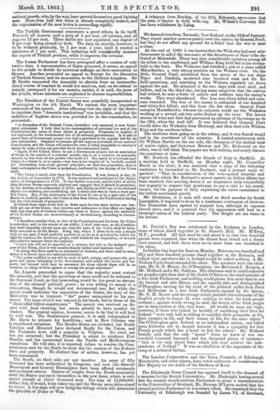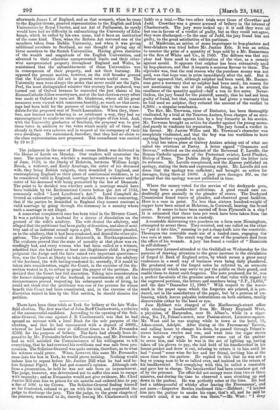The Edinburgh Town Council has opposed itself to the demand
of a member for the Scotch Universities. Mr. Mbecknight having moved that the council should petition Parliament to grant a representative to the Universities of Scotland, Mr. Duncan M`Laren moved that the council petitionTaxliament to a contrary effect. He remarked that the University of Edinburgh was founded by James VL of Scotland,
afterwards James L of England, and as that monarch, when he came to the English throne, granted representation to the English and Irish Universities by Royal Charter, and not Act of Parliament, he surely would have had no difficulty in enfranchising the University of Edin- burgh, which he called by his own name, had it been an institution' of the same kind. Then, when the Reform Act restored one of the members taken from Dublin University, and when it was giving additional members to Scotland, no one thought of giving any of these members to the Scotch Universities. Having given statistics of the wealth and magnitude of the English Universities, and adverted to their otherwise unrepresented limits and their other- wise unrepresented property throughout England and Wales, he maintained that the enfranchisement of these Universities was in consequence of their property, and not their learning. He opposed the present motion, however, on the still broader ground that the Universities did not in general return useful men. The University men were always the moles that never could see the light. Peel, the most distinguished minister this century has produced, was turned out of Oxford because he conceded the just claims of his RomanCatholic fellow-countrymen, and at the last election every effort was made at Oxford to turn out Mr. Gladstone, where all his great measures were viewed with rancorous hostility, so much so that meet- ings had been held for the purpose of inviting him to become a can- didate for the proposed seat of South Lancashire. When they, there- fore, saw learned men behaving in so intolerant a way, they had no encouragement to confer on them special privileges of this kind, And, with the University graduates of Scotland, the proposal was to give them votes in addition to the votes which nearly all of them had already in their own spheres and in respect of the occupancy of their own dwellings. He maintained, therefore, that they had no claim to the class representation now proposed. The amendment was carried by 19 to 7.































 Previous page
Previous page